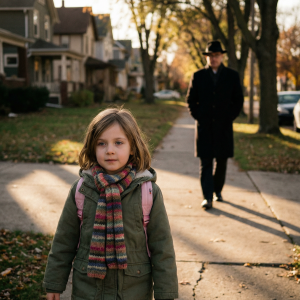The courtroom in Lübeck, Germany fell silent on March 6, 1981, as Marianne Bachmeier walked through its doors with unwavering determination etched across her face.
Without warning, she reached into her handbag, pulled out a pistol, and fired eight shots at Klaus Grabowski, the 35-year-old man accused of brutally killing her seven-year-old daughter, Anna.
Seven bullets found their target. Grabowski collapsed instantly, breathing his last on the courthouse floor while Anna’s mother stood over him, weapon still smoking in her hand. Police seized her immediately, but Marianne displayed not even a flicker of regret.
Four decades have passed, yet the “Avenging Mother” remains embedded in public consciousness—her actions continuing to spark fierce debate across an entire nation.
A Mother’s Worst Nightmare
No pain compares to losing a child—experts universally recognize it as the most devastating blow any parent can suffer.
May 5, 1980, marked the day Marianne Bachmeier’s world collapsed forever. During the 1980s, she worked tirelessly as a single mother, managing a small pub in northern Germany’s Lübeck while raising her daughter alone.
Marianne’s early years had been scarred by unimaginable hardship. Her father served in the Waffen-SS, among Nazi Germany’s most notorious military units. Throughout her childhood and teenage years, she endured multiple sexual assaults by different perpetrators.
Pregnancy came first at sixteen—too young and unprepared to care for an infant, she made the difficult decision to surrender the baby for adoption. Two years later, history repeated itself when another pregnancy led to a second adoption.
But in 1973, everything changed. Marianne welcomed Anna into the world and, despite remaining unmarried, committed herself to raising this third child personally.
Those who knew Anna described her as a “joyful, curious little girl.” Tragically, happiness would prove fleeting for both mother and daughter.
The Day Everything Changed
During May 1980, Anna and Marianne experienced a typical mother-daughter disagreement. Frustrated, the young girl chose to skip school that morning, instead heading toward a friend’s home for comfort.
She never arrived.
Klaus Grabowski, a 35-year-old local butcher, intercepted Anna during her walk. He forced the terrified child to his apartment, where he held her captive for hours, subjecting her to horrific abuse before ultimately strangling her to death.
After murdering Anna, Grabowski stuffed her small body into a cardboard box, then transported it to a remote spot along a canal bank. When he returned later to bury the evidence, police were waiting—his own fiancé had reported him to authorities that very evening at his regular drinking establishment in Lübeck.
This wasn’t Grabowski’s first offense. He already carried convictions for sexually assaulting two other young girls in previous years.
During a 1976 prison sentence, he voluntarily underwent surgical castration. However, two years before Anna’s murder, he began hormone treatments to reverse the procedure, hoping to restore intimacy with his fiancé.
Blaming the Victim
When confronted with evidence, Grabowski readily admitted to killing Anna but vehemently denied any sexual assault. During court proceedings, he made an even more shocking claim—that seven-year-old Anna had attempted to seduce him.
The killer had the audacity to blame his innocent victim for her own death. According to his twisted narrative, Anna supposedly threatened to expose him unless he paid her money, leaving him “no choice” but to silence her permanently.
His fabricated story portrayed the child as a calculating blackmailer who “forced” him into murder.
The court rejected this absurd defense entirely.
However, Grabowski’s lies sent Marianne into a spiral of rage, helplessness, and consuming fury. On March 6, 1981—the trial’s third day—she decided the legal system had failed her daughter.
Eight Shots in a Courtroom
Somehow, Marianne managed to smuggle a loaded firearm past multiple security checkpoints and armed guards. Once inside the courtroom, she calmly retrieved the weapon from her purse, took aim at her daughter’s killer, and methodically emptied the clip.
Seven of eight bullets struck Grabowski, dropping him instantly. Death came quickly.
Marianne immediately released her grip on the Beretta M1934, letting it clatter to the floor. Her voice echoed through the stunned courtroom:
“That man murdered my daughter… I intended to shoot him in the face, but the bullets hit his back instead… I pray he’s truly gone.”
Witnesses reported that she also called Grabowski a “swine” after the shooting concluded.
Court officers arrested her on the spot, initially filing murder charges. During her 1982 trial, Marianne claimed she had fired in a trance-like state after experiencing visions of Anna in the courtroom.
Medical experts testified that her precise marksmanship suggested extensive firearms practice, indicating premeditated planning rather than spontaneous action.
During psychological evaluation, doctors requested a handwriting sample. Marianne complied, writing: “This was for you, Anna.” She decorated the paper with seven small hearts—one for each year of her daughter’s brief life.
If convicted of murder, she faced life imprisonment.
A Nation Divided
Marianne’s vigilante act generated massive media coverage worldwide, earning her the nickname “Revenge Mother.” Public opinion overwhelmingly supported her acquittal.
Initially, press coverage painted her as a heroic figure—a grieving mother who courageously avenged her daughter’s senseless death. Many citizens viewed her actions as justified, given the legal system’s apparent inadequacy.
However, investigative journalists soon uncovered uncomfortable details about Marianne’s past. Reports revealed she had surrendered two previous children for adoption and frequently spent evenings drinking at her workplace. These revelations began eroding the saintly image media had constructed.
In 1983, judges convicted Marianne of voluntary manslaughter and illegal weapons possession, sentencing her to six years behind bars. She served only three before gaining early release.
Her punishment sharply divided public opinion, according to Allensbach Institute polling data. Approximately 28 percent considered the six-year sentence appropriate, while 27 percent deemed it excessive and 25 percent believed it insufficient.
Life After Prison
Following her release, Marianne relocated to Nigeria, where she married a German educator. The marriage dissolved in 1990, prompting her move to Sicily, Italy.
Eventually, doctors diagnosed her with pancreatic cancer, forcing her return to Germany and her hometown of Lübeck.
German newspapers continued covering her story throughout the 1990s, keeping the controversial case in public consciousness.
In a rare 1994 radio interview, thirteen years after the shooting, Marianne reflected on her actions:
“I believe there’s an enormous difference between my situation and his. He murdered an innocent child because he feared imprisonment for life. Consider also his methods—strangling a little girl from behind, which matches his own confession: ‘I heard sounds from her nose, became fixated, then couldn’t bear looking at her body anymore.'”
During a 1995 television appearance, Marianne admitted she had shot Grabowski deliberately and with full awareness, hoping to prevent him from spreading additional lies about Anna.
Final Rest
On September 17, 1996, Marianne died in a Lübeck hospital. She had hoped to spend her final days in her beloved Sicily but never managed the journey.
She was laid to rest beside Anna in Lübeck’s cemetery, finally reunited with the daughter whose death had consumed her life.
An Enduring Debate
Marianne Bachmeier’s story continues generating passionate discussion decades later. Supporters argue she delivered appropriate justice to a repeat child predator who had escaped adequate punishment through legal channels.
Critics maintain that vigilante action undermines the justice system, regardless of circumstances. They insist she should have trusted judicial processes rather than taking lethal action.
The case remains one of Germany’s most polarizing criminal proceedings, forcing society to grapple with fundamental questions about justice, revenge, and a parent’s love.
What’s your perspective on this complex case? Share your thoughts and join the ongoing conversation.





